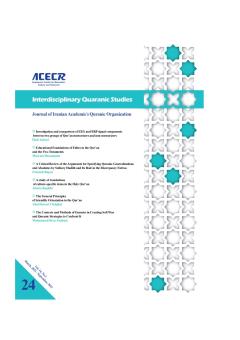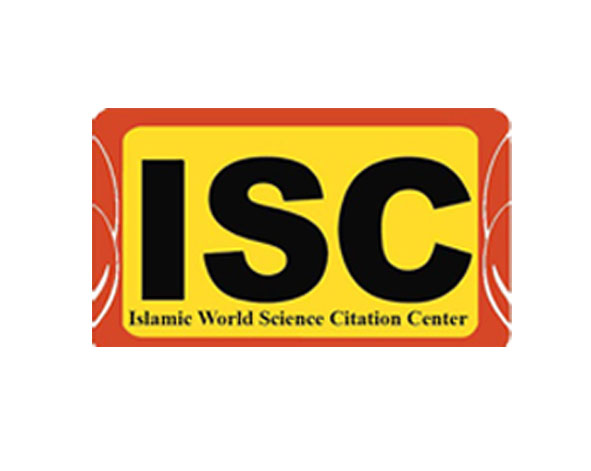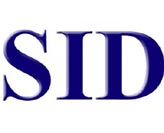About the journal
Quran Interdisciplinary Studies Journal
The biannual journal is available for researchers and scholars in the following websites:
Islamic World Science Citation Center:www.isc.gov.ir
Noor Specialized Magazines Website: www.noormags.com
Iran magazines website: www.magiran.com
Website of regional center for science and technology information: www.srlst.com
ACECR’s scientific information database: www.sid.ir
Recent Articles
-
Open Access Article
1 - Investigation and comparison of EEG and ERP signal components between two groups of Qur'an memorizers and non-memorizers
hadi akbari * ، majid mazinani ، elias Mazoei radIssue 24 , Vol. 13 , Spring 2022 -
Open Access Article
2 - Educational foundations of ethics in the Quran and the Testaments
marim hasan por *Issue 24 , Vol. 13 , Spring 2022 -
Open Access Article
3 - "A Critical Review of the Evidence for Specifying Generalizations (Takhṣīṣ ʿUmūmāt) and Restricting Absolutes (Taqyīḍ Iṭlāqāt) in the Quran through Solitary Hadiths (Khabar al-Wāḥid) and Its Role in Jurisprudential Discrepancies (Ikhtilāf al-Fatāwā)"
فاطمه رجائی * ، Mostafa momeniIssue 24 , Vol. 13 , Spring 2022 -
Open Access Article
4 - بررسي ابعاد توسعهو توسعه نيافتگي در علم اقتصاد و مصادر اسلامي (قرآن و نهج البلاغه)
Elmira Raghibi *Issue 24 , Vol. 13 , Spring 2022 -
Open Access Article
5 - General principles of scientism in the Qur'an
Ahad Davari Chelaghaee *Issue 24 , Vol. 13 , Spring 2022 -
Open Access Article
6 - The enemies' platforms and methods for creating soft war and strategies for dealing with it from the perspective of the Quran
mohamadreza asiabani * ، narges bahramiIssue 24 , Vol. 13 , Spring 2022
Most Viewed Articles
-
Open Access Article
1 - Investigating Effectiveness of Contemplating the Quran on Mental Health
mahdi esmaeili ، Mahdi Esmaeili * ، mohsen rafikhah ، Zahra NaghizadehIssue 14 , Vol. 7 , Spring_Summer 2016 -
Open Access Article
2 - Potentials of Architecture According to Quality of Human Life in the Holy Quran
Farideh Davoovi hamooleh * ، mohammad hosein fallah ، mahdi esmaeili ، mehran alipourIssue 11 , Vol. 5 , Autumn_Winter 2014 -
Open Access Article
3 - References and Bibliography of Interdisciplinary Studies of Quran and Health
MAHDI ESMAEILI SADR ABADI ، mohsen rafikhah * ، asieh ostadi ، Zahra Naghizadeh ، mahdi ganjourIssue 17 , Vol. 8 , Autumn_Winter 2018 -
Open Access Article
4 - The Index of Interdisciplinary Quranic Studies Journal
mahdi ganjour *Issue 20 , Vol. 10 , Spring_Summer 2019 -
Open Access Article
5 - Identifying and Analyzing the Existing Gaps in Researches Done in the Field of Teaching Quran
Zohre jafarifar * ، Zahra NaghizadehIssue 17 , Vol. 8 , Autumn_Winter 2018 -
Open Access Article
6 - study and classification of science and knowledge in the hole Qur’ani
MAHDI ESMAEILI SADR ABADI ، Najmeh .kazemi *Issue 15 , Vol. 7 , Autumn_Winter 2016 -
Open Access Article
7 - Quran’s View of True Peace
Shima mahmoodpoor *Issue 13 , Vol. 6 , Autumn_Winter 2015 -
Open Access Article
8 - Thematic research methodology in the Holy Quran: the designing a practical method for interdisciplinary researches
Saeed Masoodipoor * ، Mahdi SepehriIssue 12 , Vol. 6 , Spring_Summer 2015 -
Open Access Article
9 - Identifying and Rating Areas of Research in Interdisciplinary Field of Quranic Sciences and Educational Sciences
Leila Khosravi Morad * ، zahra naghizadeh ، zahra feizi ، Hamid Reza YunesiIssue 19 , Vol. 9 , Autumn_Winter 2019 -
Open Access Article
10 - Administrative Corruption, Causes and Strategies to Combat It from Perspective of Quran Verses and Tradition
جمال فرزند وحي *Issue 9 , Vol. 4 , Autumn_Winter 2013








